Some of the best VPNs for torrenting are characterized by stable connections, rock-solid security, and exceptional speeds for superb performance. Among the big boys, we have TorGuard, a provider made with torrenting in mind, that later became a much larger service with thousands of users. In this TorGuard review for 2025, we’ll see exactly how good it is and what it brings to the table.
At first, TorGuard seems outdated and its website isn’t as polished as you’d expect it to be. On the other hand, it doesn’t take very long to realize that we’re talking about a very secure service with tons of features, both mandatory and bonus, which make it a very attractive option.
Our TorGuard VPN review will tell you all about those features as well as guide you through many tests and analyses we do in our reviews. We’ll see how capable it is for streaming and torrenting but also evaluate its performance, device compatibility, support, price, and many other crucial features.
This isn’t a very affordable provider by any means, so before you spend your hard-earned cash on it, make sure you read our full, in-depth, and comprehensive review of TorGuard VPN for 2025. It’s going to be a long ride but an interesting one indeed.
The 3 best alternatives to TorGuard VPN:
7492 servers
118 covered countries
30 days money-back guarantee
10 simultaneous connections
9.8 /10
3000 servers
105 covered countries
30 days money-back guarantee
8 simultaneous connections
9.4 /10
12000 servers
100 covered countries
45 days money-back guarantee
7 simultaneous connections
9.2 /10
TorGuard User Experience & Device Support
As always, the TorGuard VPN review for 2025 will start with a discussion about device support and user experience. Truth be told, this provider isn’t exactly modern and it doesn’t focus on being as polished, modern-looking, and smooth as ExpressVPN or its rival NordVPN.
Instead, it focuses on pumping out the best possible security features for advanced users and doing it on the most popular platform. It reminds me of AirVPN but I can say TorGuard’s user experience is much better and feels more “premium.”
For the start, the provider supports platforms like Windows, macOS, Linux, Android, and iOS. In simple terms, it supports every desktop/mobile platform, which is excellent. Since I touched on Linux, the service will work on Mint, Debian, and Ubuntu 14, but only with 64-bit versions of them.
In addition, we should mention TorGuard’s browser extensions for Chrome, Edge, and Firefox, although these extensions aren’t the most feature-rich. Now, in terms of simultaneous connections, TorGuard supports from 8 to 30 of them depending on the subscription plan.
More about that later in this in-depth review of TorGuard VPN.
Desktop and Mobile Apps
As stated, the user experience with TorGuard VPN isn’t the best around. Its outdated-looking app, however, is functional, and during my time with it, I’d be lying if I said I noticed bugs, glitches, and slowdowns. Mind you, I’ve been using it on Windows.
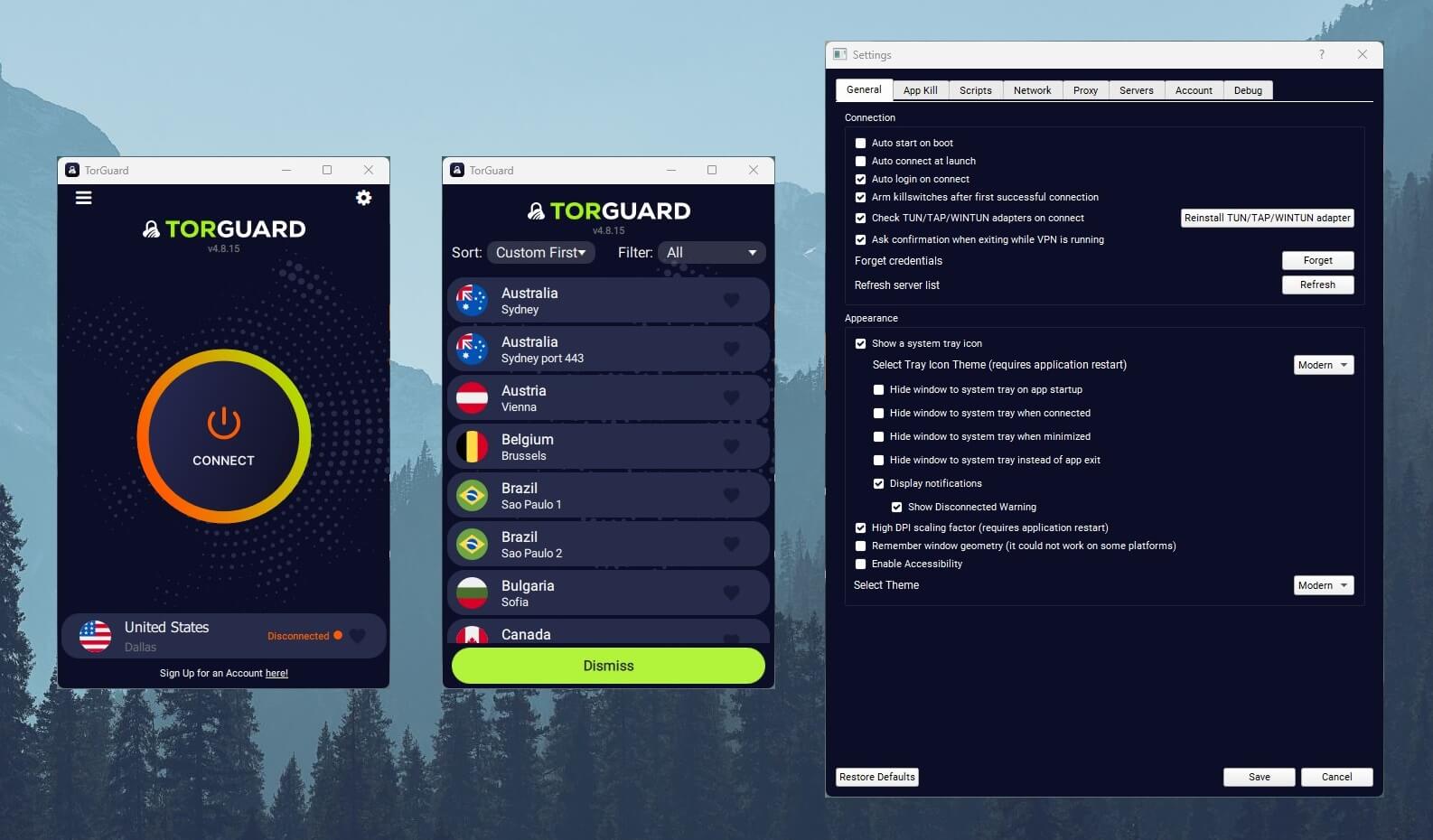
The screenshot above shows you how the TorGuard VPN app looks. A big connection button is in the middle and it takes a single click on it to connect to a server. Below, you can open the server list, which can be filtered according to different filters and parameters for easier access.
Since TorGuard offers specialty servers, you can select them from the Filter drop-down menu or you can sort them out alphabetically, by proximity, and other factors. Clicking on the three horizontal lines in the upper-right portion allows you to change the protocol.
And if you click on the Gear icon, you’ll open Settings, which looks terrible. I mean, these settings are all over the place, and since the menu looks like a WordPad document, you’ll need quite a bit of time to get used to it and find the settings you want easily.
On the other hand, you can select the theme you want by choosing Modern or Classic. Above, you’ll find tabs of other features that I’ll discuss later in the TorGuard review but generally speaking, the app is outdated, unintuitive, and definitely not beginner-friendly.
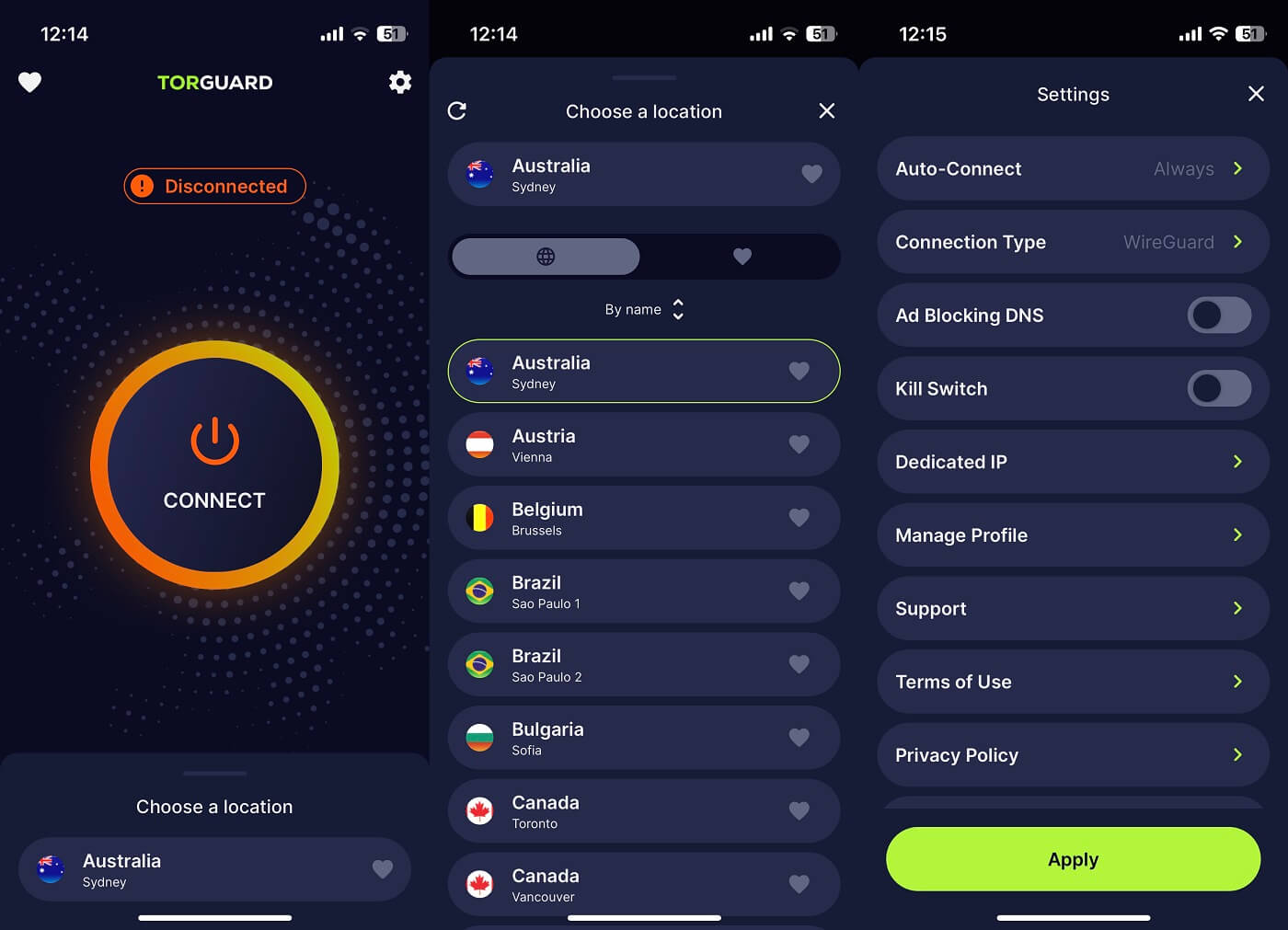
A similar trend resides on mobile devices, for example. While iOS and Android apps are painfully similar to their desktop counterparts, the apps are somewhat different. You don’t have as many features here and the apps look a touch more modern and streamlined.
I’d venture to say that I enjoyed TorGuard on my iPhone better than on my Windows PC. Albeit, the number of features you get as a PC user is astonishing and I’ll discuss it later in this TorGuard review.
TV Apps
TorGuard can also be used on your TV, as long as you fulfill certain criteria. For one, you need to have a Smart TV that supports VPNs, and two, you need to install the VPN on your TV! Recently, I did an article about the best VPN for Android TV, which I highly recommend checking out.
For now, I’ll tell you that TorGuard indeed works on Android TVs and its app is available directly on Google Play. If you have a TV from Samsung or LG, these TVs have custom systems, so you’ll need to find a workaround by installing a VPN on a router or sharing your VPN connection.
The good news is that since 2018, TorGuard started supporting all Amazon devices. Thus, you can enjoy it on Fire TV, Fire HD, and other similar products. It’ll also work on streaming devices like Chromecast, Nvidia Shield TV, and Apple TV, which is great for streaming enthusiasts.
Gaming Apps
Gaming with TorGuard is a decent option if you’re looking for a safe and secure provider. While not the fastest VPN out there, this service serves many people for torrenting and gaming. The great news is that it has router support, so it can be installed on gaming consoles.
Users can, therefore, enjoy the service on Nintendo Switch, PlayStation 5, or Xbox Series X by using the methods I mentioned a minute ago. Of course, gaming apps also include the ones we talked about, as many people also play games on their computers, smartphones, tablets, and laptops.
Router Support
Lastly, router support in this TorGuard review isn’t the best and if you have certain “unpopular” models, chances are you’ll have to flash your router. That’s because the provider supports the four main firmware options:
- DD-WRT
- OpenWRT
- Tomato
- Merlin
If you have one of these, installing TorGuard VPN is simple and requires you to follow the steps on the website. However, not having one of these means you have to flash your router, which takes additional experience and might leave you with a bricked device with a warranty void.
On routers, WireGuard isn’t supported and the provider uses OpenVPN and PPTP VPN servers. PPTP is an older, less secure protocol, so we recommend using OpenVPN just to be sure you’re safe online and that you can enjoy top-notch performance at any given moment.
Is TorGuard VPN Safe & Secure? All Security Features Examined!
Much like AirVPN whose accent is on security, privacy, and functionality, TorGuard VPN aims to provide its users with the same merits. In this TorGuard review for 2025, we’ll examine its security features and see just how feature-rich it is compared to some of its direct rivals.
256-bit Encryption
Starting with the type of encryption, TorGuard won’t reinvent the wheel – and it shouldn’t. 256-bit AES encryption is the name of the game here, as the provider gives you the strongest level of encryption for avoiding ISP surveillance, hackers, and other cyber threats.
In my recent review of IPVanish, I mentioned that this US-based provider also uses this encryption, as well as ExpressVPN, CyberGhost, NordVPN, and many others. Since TorGuard follows in their footsteps, complaining about anything would be foolish.
App Kill
What exactly is this App Kill feature? Well, it’s a kill switch that can work on the system level and on the app level. On the system level, it’ll stop all traffic if you lose your VPN connection, which prevents data leaks and conceals your online identity.

App Kill, however, allows you to terminate particular apps if you lose the VPN connection. You have a list where you can add certain apps and even processes. From here, simply tick the box to confirm your choice and click on Save.
Now, if the VPN connection is lost for any reason, TorGuard will terminate these apps to prevent them from leaking your IP address to the public eye. You can use this for games, for example, if you want to stay anonymous and not let other players know anything about you.
Ad Blocking DNS
In this TorGuard review, I found many DNS options in the app. You can block outside DNS services to prevent them from interfering with your connection. I recommend keeping this feature ON. However, there’s another option called Ad Blocking DNS, which I really like.
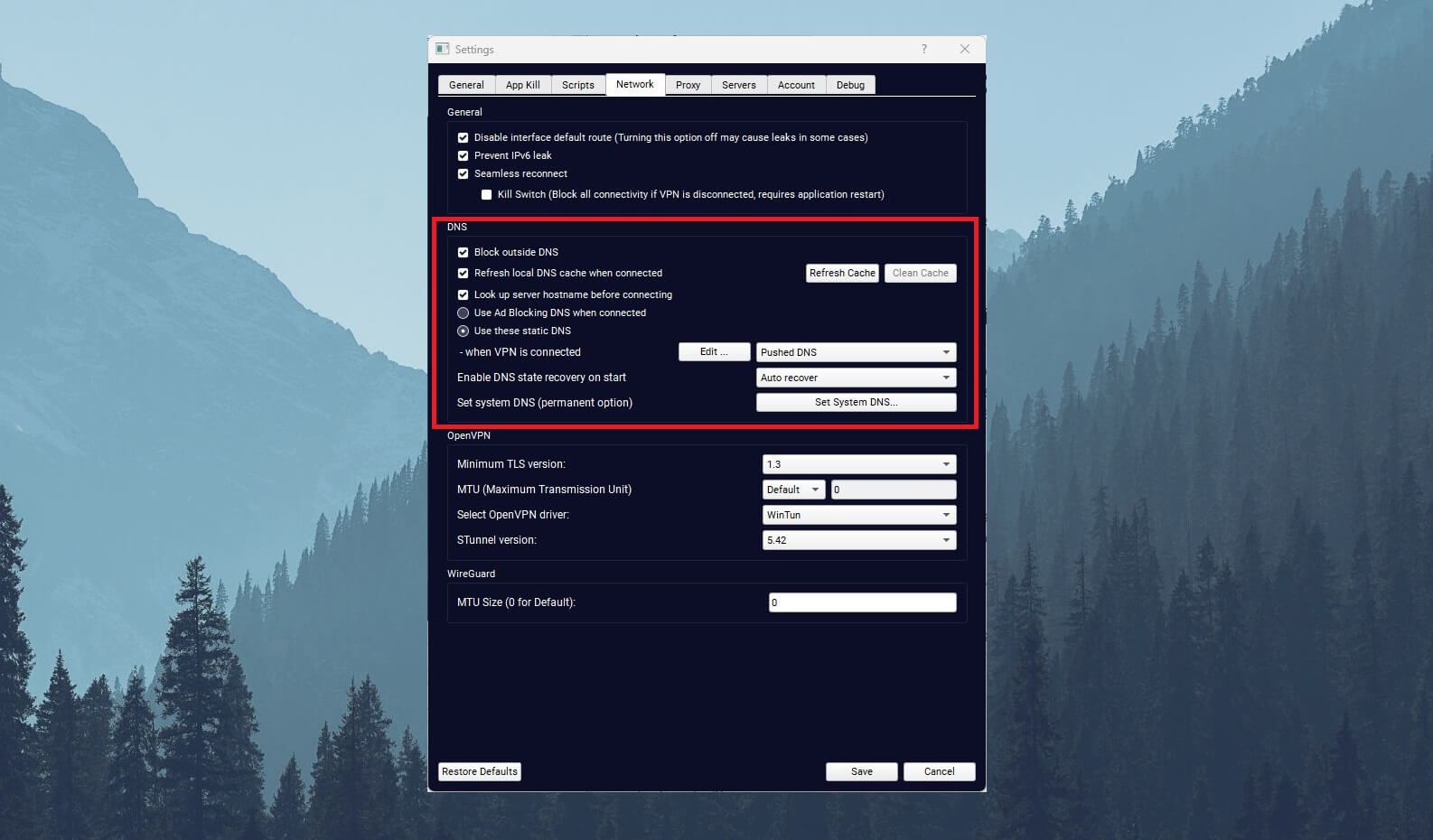
As its name implies, it’ll block ads and pop-ups that tend to annoy people and I noticed that it works well during this test. Additionally, you can use a static DNS server and choose from options like Cloudflare, Pushed DNS, Quad9, and even China DNS.
With so many options to tweak here, you can let your imagination do the job and fiddle around to your heart’s contempt.
WireGuard/OpenVPN Support
TorGuard supports three protocols in total, two of which are WireGuard and OpenVPN. On the home screen, you’ll find this OpenConnect protocol as well. This is yet another open-source protocol for PTP connections that some people will find useful.
However, I recommend sticking to WireGuard or OpenVPN, with an advantage for WireGuard. WireGuard is customizable, and you can choose MTU size and a few other settings. OpenVPN allows you to choose from UDP and TCP protocols and select a custom port.
Above all, OpenVPN lets you reduce your encryption to AES-128-GCM if you want to prioritize speeds, although AES-256-GCM encryption isn’t impacting your performance at all in my experience.
Stealth Proxy
While using TorGuard you can enjoy the addition of a proxy. Aside from using a custom proxy server, which can be HTTP or SOCKS5, the provider allows for the implementation of Stealth Proxy. This feature should allow you to bypass firewall restrictions and get over censorship easily.
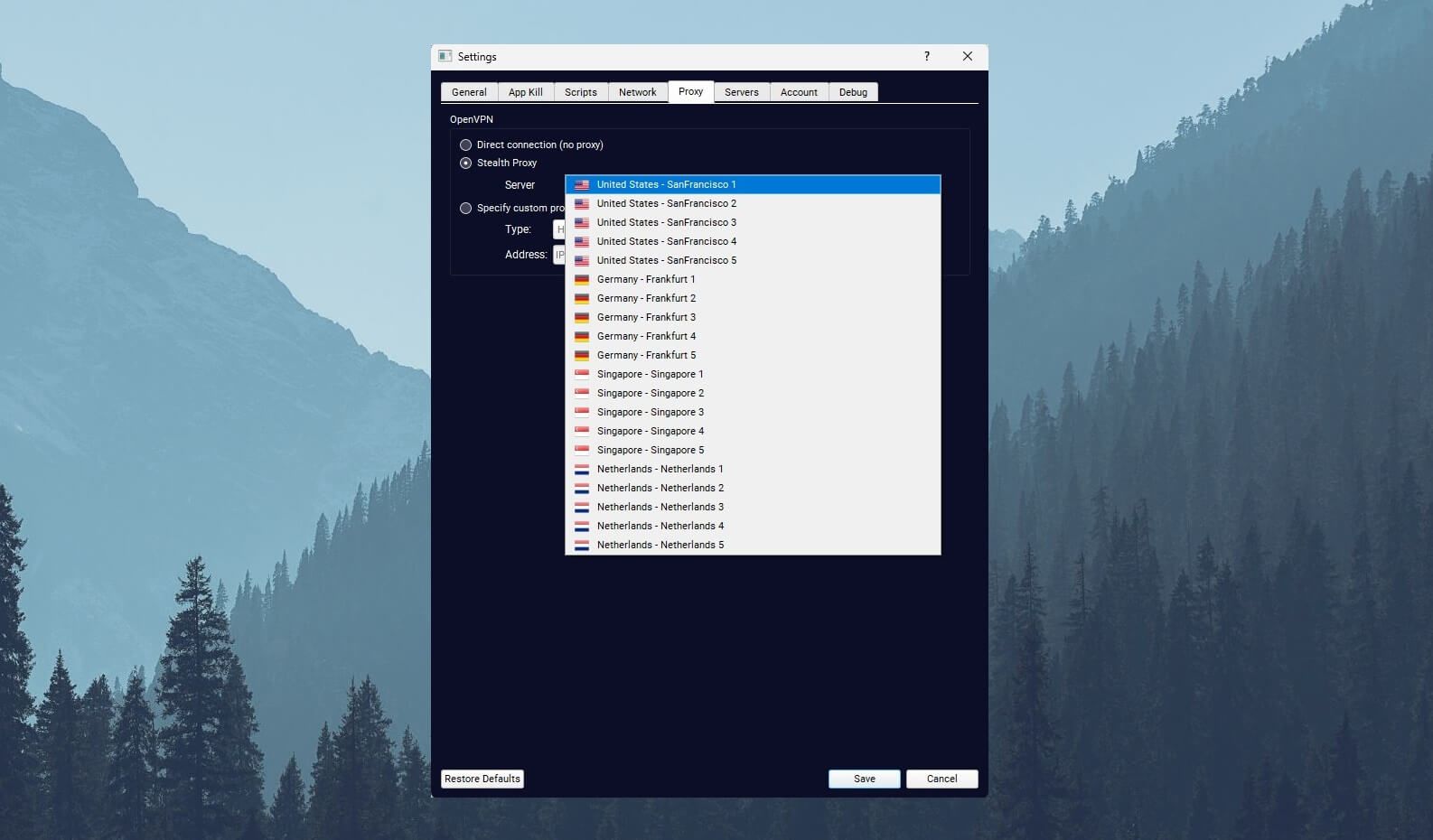
Alas, it offers just a few countries to pick from, such as the US, the Netherlands, Germany, and Singapore. Do these servers work for bypassing censorship in Iran or China? We’ll talk more about that when discussing bypassing censorship and its ability to work in censored countries.
Dedicated IP Address
A feature I found very handy was the dedicated IP address. Let me correct myself – tons of dedicated IPs in different countries, which even some high-end providers won’t offer. ExpressVPN doesn’t have this option, while NordVPN and CyberGhost gladly offer it.
TorGuard goes a step ahead and offers dedicated IP functionality in plenty of countries and locations. Sure, the majority of them are stationed in the United States but you can also buy dedicated IP addresses from the UK, Sweden, Japan, Ireland, Norway, and many other countries.
Each dedicated IP costs the same, so it’s great if you need any of them to ensure no CAPTCHA verifications or if you have a company where you want each member to have a dedicated IP. Either way, it’s affordable and it’s a great security feature, so why not mention it?
TorGuard VPN IP and DNS Leak Test: No IP/DNS Leaks Found
With all of these things in place, TorGuard’s security can be described with one word – impenetrable! The provider’s synergy of features, protocols, and encryption allows you to stay anonymous online regardless of the server you’ve connected to.
I had no doubts it’ll be great but still, I connected to the first US server I found and I wanted to test the service for potential leaks. I’m located in Europe and when I visit ipleak.net, the only IP and DNS addresses I see belong to the US, so my connection is fully encrypted.
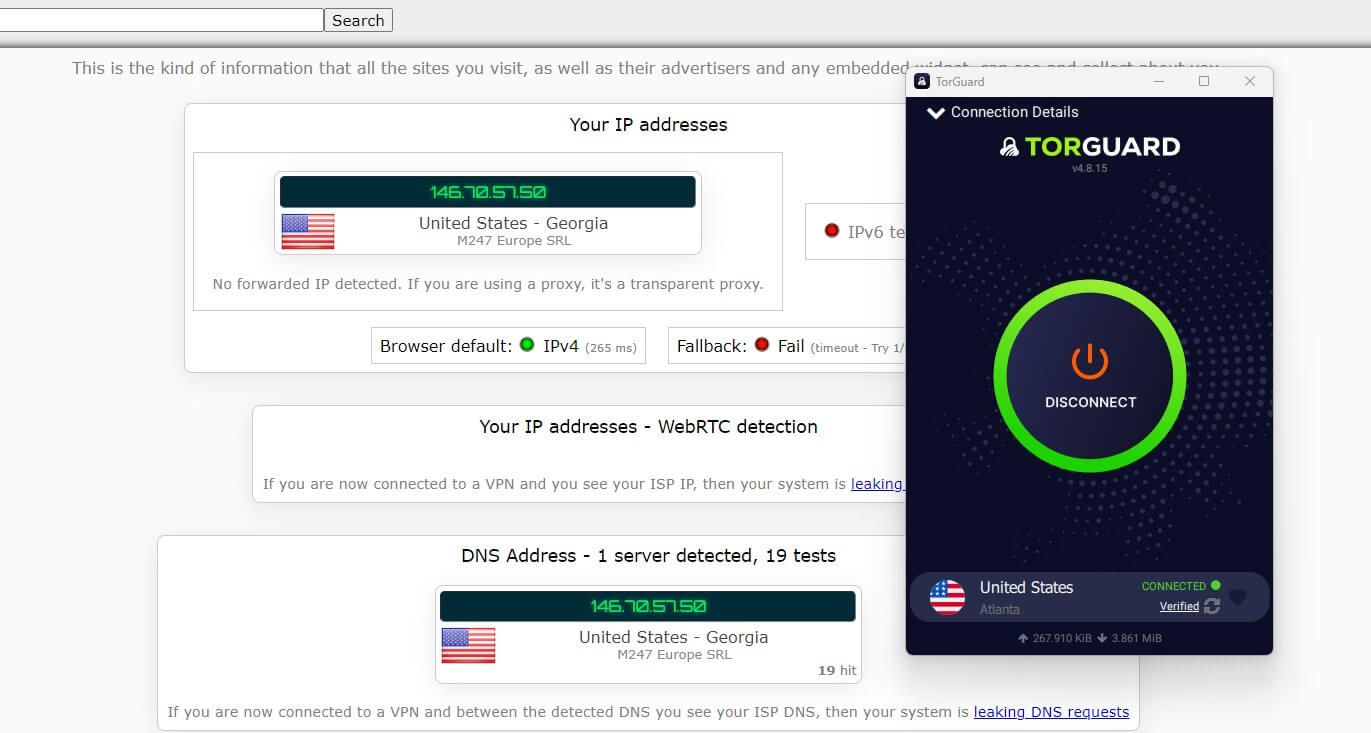
Moving on, I also used the website browserleaks.com. This site functions the same, and when testing for IP and DNS leaks, the results were the same – in short, excellent.
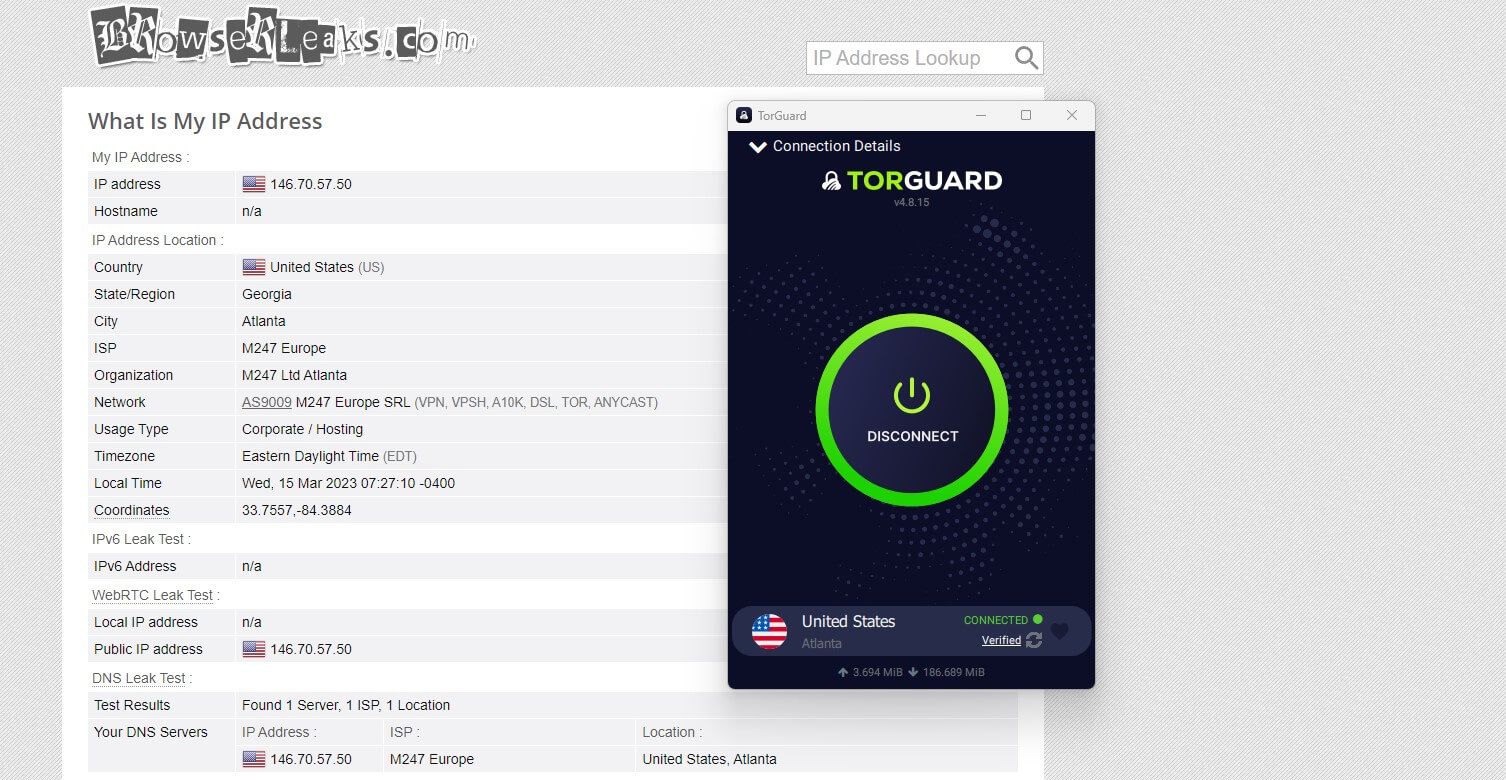
As expected, this TorGuard VPN review for 2025 was going to be positive at least security-wise. But what about its logging practices? Does it store any logs? Let’s see…
Does It Have a No-Logging Policy?
TorGuard is a company with a long history of success in the field of privacy and security. However, it’s worth noting that the company is based in Orlando, which is in the US. As many of you know, we’re talking about a founding member of the 5 Eyes.
The 5 Eyes is a group of countries like the US, the UK, Australia, Canada, and New Zealand, all notorious for government surveillance and data-retention laws. This is bad news for a service that focuses on privacy but that doesn’t have to be the case.
Windscribe is a good free VPN from Canada that stores no logs. Private Internet Access is a US-based provider with zero logs as well. On the other hand, we have HMA VPN from the UK and IPVanish from the US with a few scandals in terms of providing logs to the authorities and cooperating with the FBI.
Which Information Isn’t Stored?
Fortunately for us, TorGuard had no scandals and at the time of writing this review, it’s actually pretty secure and transparent. What’s more, its no-logging policy is short and to the point, so you can easily know what’s stored and what’s not.
The provider doesn’t collect any data from its proxy or VPN services, which means data like your IP address, DNS requests, browsing history, and geolocation aren’t going to be compromised. As such, we can’t complain about its focus on privacy given the minimal logging practices.
Which Information Is Stored?
When it comes to the information that TorGuard stores, we’re usually talking about payment information which is necessary for the subscription to work. They, however, don’t store credit card numbers, which is excellent if you’re using this payment method.

In this TorGuard review, I found that it stores anonymized Matomo analytics data. Matomo is an open-source web analytics application and you can opt out of data collection by using the link in the privacy policy of TorGuard VPN, which I recommend doing.
Moving on, the provider logging includes contact data for the support team and Apache Webserver logs. You can visit the official site of Apache to find out more but generally speaking, Apache Webserver logs aren’t particularly intrusive and won’t include your IP address and other crucial logs.
TorGuard’s Self-Audit
One funny thing I found online is that TorGuard has an audit from itself! Yes, the company reviewed its network carefully and found a so-called HeartBleed SSL bug, which represents a vulnerability in the OpenSSL software library.
Through the audit of the entire server fleet, the company managed to find the bug precisely and eliminate it, which is proven in its blog article about the case. As for third-party audits regarding privacy and security, the provider has nothing to offer.
On the contrary, we have ExpressVPN and NordVPN with audits from PricewaterhouseCoopers, representing a bit better options if you’re looking for fully-audited VPNs.
TorGuard for Streaming: Streaming Platforms TESTED
If you want a VPN to watch foreign TV channels or unblock streaming services across the globe, TorGuard ranges from being bad to being good, but not excellent. You see when purchasing the “Anonymous VPN” option, which is the default, cheapest option, streaming capabilities are questionable.
This option doesn’t include dedicated Streaming IP addresses. As such, when I tested TorGuard out of the box, I found that it can’t unblock popular streaming services. It is, in fact, always detected by streaming platforms and all I stared at were error messages.
While some less popular streaming channels will work, the main US TV channels, for instance, are not unblockable by the provider when using “normal” US servers. Despite not being particularly cheap, TorGuard requires you to purchase these Dedicated Streaming IP addons.
And you know what? They’re really expensive.
Each Dedicated Streaming IP address costs $7.99/mo regardless of the location you choose. If you want to watch US streaming services, you’ll need to buy a US IP address – logically. But if you want to stream services in the UK, Canada, and other countries, that’s already 3 times as much.
Multiply $7.99/mo with 3 or 4 and you’re already paying $24-$32 a month ON TOP of your standard subscription. Yet, these streaming add-ons aren’t guaranteed to always work! They’re definitely working, but you’ll still get occasional error messages and be unable to unblock particular streaming platforms.
Keep in mind that TorGuard doesn’t offer a refund for Dedicated Streaming IP addons, so if you’re dissatisfied, you’re left with an IP you can’t fully utilize. A much better VPN for streaming is ExpressVPN and at a significantly cheaper monthly price, it unblocks everything you throw at it.
Speed Tests: Here’s How Fast TorGuard VPN Really Is
Nevertheless, I think it’s time to see how fast TorGuard VPN is in this review for 2025. As said, the provider offers several security protocols, where WireGuard is included, so we should be able to get some decent performance out of it.
However, before we divulge our testing results, we need to demystify our testing parameters. I mentioned that I’m located in Europe earlier in the review, so in my location, the native internet speeds I have when not using a VPN look like this:
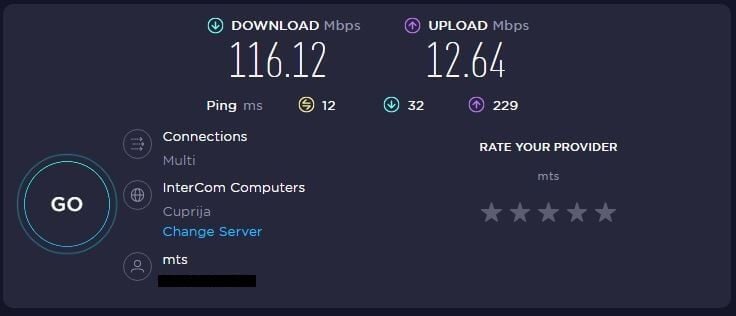
When testing TorGuard, I decided to use the same principle I use for every provider. This means testing it for 3 days in a row, 3 times a day, across 4 popular server locations which include the UK, the US, Australia, and Japan.
This is a combination of near and distant servers, which should give you proper real-world results regarding the VPN’s performance. Oh, and one more thing – I set my protocol to Automatic, which makes TorGuard select the protocol for me according to the server location I pick.
Now that you know everything there is to it, let’s check out the speed test results:
UK:
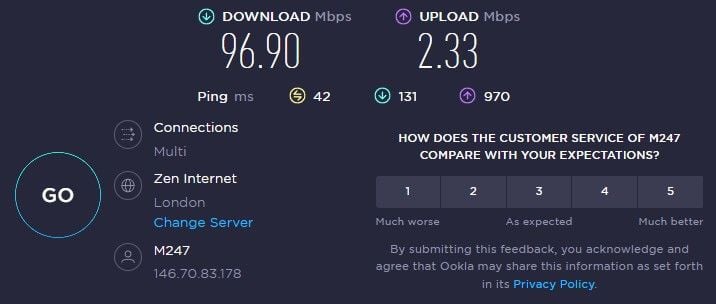
US:
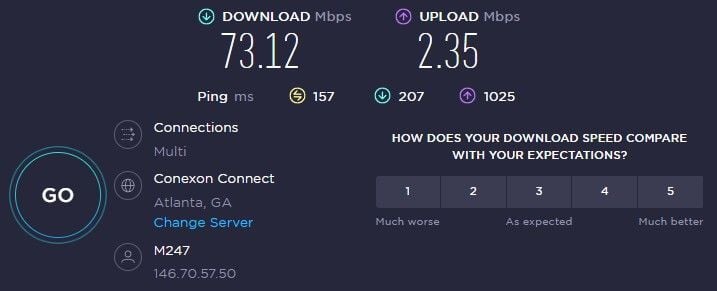
Australia:
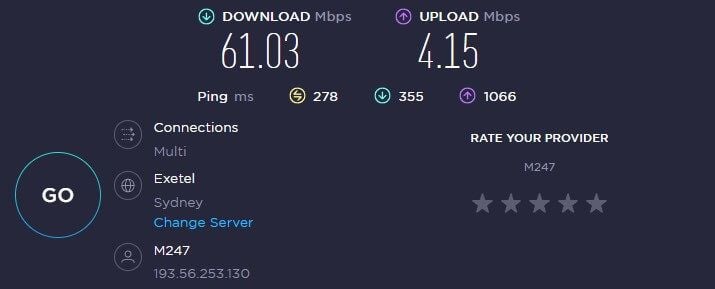
Japan:
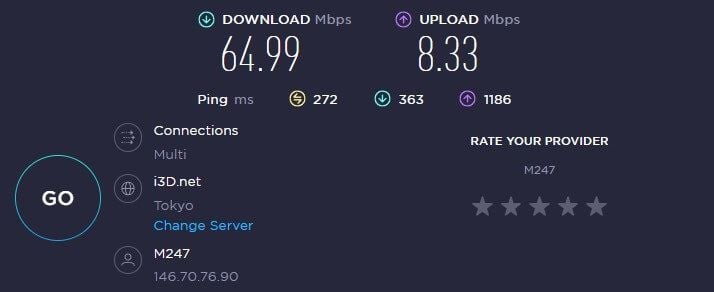
We can see that TorGuard is a solid performer across the board. Its network is optimized for torrenting, so the fact that it’s reasonably fast doesn’t surprise us. Of course, servers in the UK and the US are the best in terms of download/upload speeds and latency.
While the latter two servers are noticeably slower, the performance I got on them wasn’t terrible, to say the least. You can still expect somewhat fast speeds, albeit with increased latency. That’s something you won’t get with ExpressVPN or CyberGhost.
Is TorGuard VPN Good for Gaming?
Speaking of increased latency, TorGuard won’t provide a great gaming experience on distant servers, especially those in Australia in Japan. That is if you’re not located in one of these countries – if you are, then you can expect close to native speeds.
Generally speaking, TorGuard’s gaming performance isn’t bad. As a PS5 VPN that also works on Xbox, Nintendo Switch, and desktop/mobile platforms, its gaming performance is sublime. I played fast-paced FPS games online with no problems even on some American servers.
You can also count on him if you are looking to play Valorant in another region.
On the flip side, when I tried cloud gaming on Nvidia GeForce Now and Xbox Cloud Gaming, the performance was all over the place. Input lag took a toll on the gameplay which made only slow-paced games enjoyable.
On the grand scale, TorGuard provides average gaming performance and you’ll be happy with it if your demands aren’t sky-high. If they are, once again, opt for ExpressVPN and its Lightway protocol that boosts your speeds and makes every online activity buttery-smooth.
Torrenting (P2P) with TorGuard
In my TorGuard VPN review for 2025, torrenting is perhaps the most important part. The provider’s name came from torrenting (the word “Tor” in the name signifies it) and it prides itself on being the best option in this regard.
Indeed, it offers plenty of options for P2P, such as SOCKS5 proxy and port forwarding, both of which are aimed at boosting torrenting speeds and making the entire process quicker. Also, pretty much all servers are torrent-friendly, which is great for finding the one close to you.
I connected to a server in my country for this test to maximize the torrenting performance. Then, I visited 1337x and downloaded Linux Mint – a copyright-free OS. As you can see in the screenshot below, I successfully downloaded it using my qBitTorrent client.
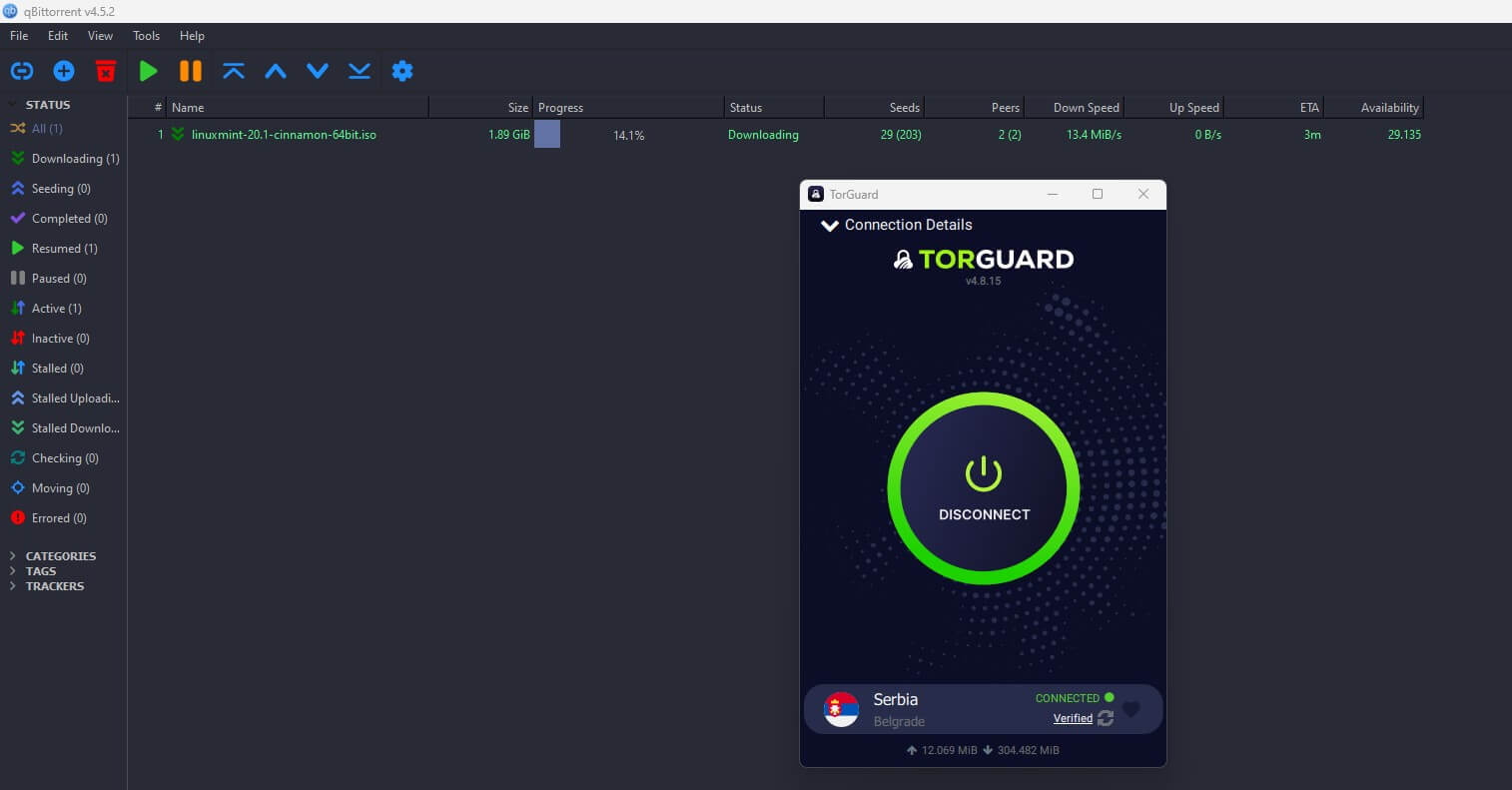
If you use port forwarding, you’ll be able to make the provider even faster but I felt no need to do that since I’m using a server in my country. Overall, the torrenting performance is top-notch and the service justified its name as one of the top VPNs for torrenting.
Is It Working in China & Other Censored Countries?
While it’s often regarded as a great VPN for P2P, the service isn’t particularly popular for bypassing censorship. In this TorGuard review, we’ll see if it’s worth your time if you live in China or any other censored country, such as Turkey or Iran.
You see, the provider is mentioning obfuscation technology and we know it’s offered. In the app, you can choose from OpenVPN and WireGuard protocols, with the addition of OpenConnect, which, as far as I know from experience, isn’t made for bypassing censorship and firewalls.
The good thing is that it offers this Stealth proxy option, which many people use for this purpose. To make sure this proxy works, I gave my subscription to a friend in China who used TorGuard and tested it using a variety of settings.
With the Stealth proxy enabled, we had moderate success with TorGuard in China. It worked at least 5/10 times, although that depends on the server location you choose. For example, choosing a Stealth proxy in the US worked for us, with a few issues displayed when choosing Germany.
On its site, TorGuard claims that the Stealth proxy works and it even provides a guide on how to use the service in China. With this setting enabled, the provider can be used more efficiently in Turkey, while Iran and its harsh censorship will still pose an obstacle for the provider.
ExpressVPN, for instance, works in every censored country and it’s a more reliable option for circumventing censorship, especially in China. However, TorGuard at least showed half-decent results, so it’s not an option that we’d discard completely.
Servers and Server Locations
Being an experienced provider, TorGuard managed to come up with a relatively large server network that counts more servers than many of its competitors. At the time of writing this TorGuard review, we’re looking at 3,000+ servers in more than 50 countries around the globe.
No doubt, the server distribution is solid, as the service covers Europe, North America, Asia, and other popular locations. It has many servers in the US with the addition of handy Asian servers in Singapore, Japan, and India.
Moreover, the provider has South American servers as well, so you can find them in Brazil and Mexico, although there aren’t any Argentinian servers. The server variety is also a big factor here. As said, you get Stealth VPN servers for bypassing censorship coupled with dedicated IPs.
The latter option is available only if you pay for it, while Stealth VPN servers are available at any subscription level. Surprisingly, the provider even has servers in Russia and you get two servers in India, which is something you won’t get from many premium providers.
Having in mind the provider has 3,000 or so servers, I expected a few more countries to pick from, although 50+ countries aren’t bad, to begin with. ExpressVPN offers the same number of servers but in 105 countries and 160+ locations, which is a lot better if you ask me.
Customer Support: How to Contact TorGuard for Help?
TorGuard’s customer support isn’t the best in the business but we can’t say it’s unhelpful. My review of TunnelBear showed that this provider has poor customer service, whereas, TorGuard is a bit more serious with its community forum, email support, and chat support.
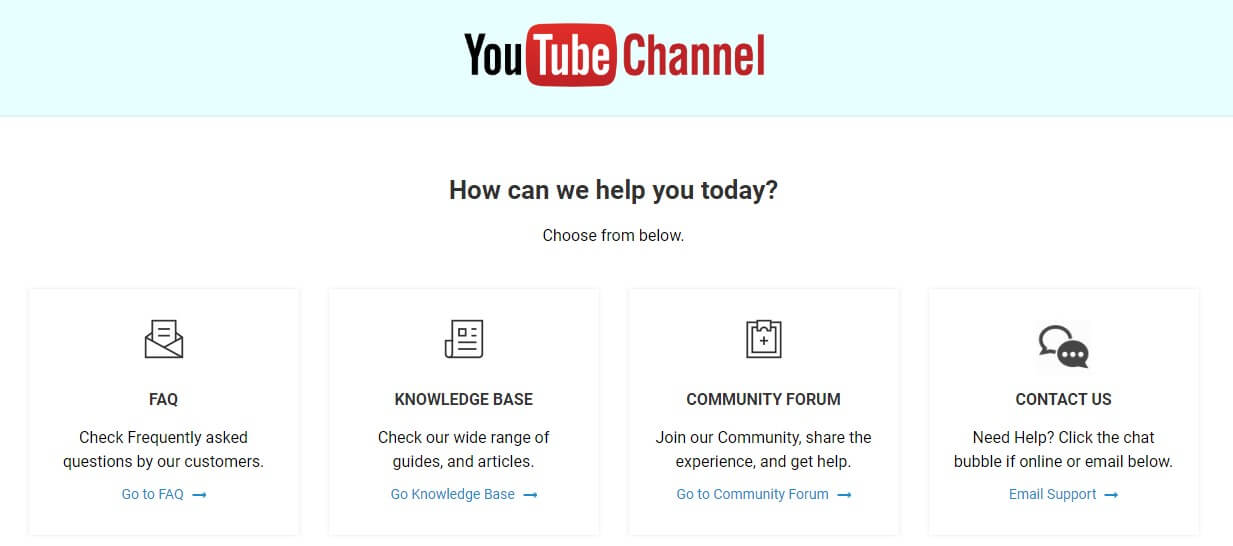
I intentionally said just “chat support” because it’s not available 24/7, so you can’t chat with the support team at any moment. When you click on “Contact Us”, you’ll usually be transferred to your mail client to send an email, after which, you’ll be left waiting for a response.
Alternatively, you can refer to the community forum where you can get a solution for your problem. FAQs and Knowledge Base are both here, as well. TorGuard does its best job to provide insightful solutions to problems and how-to guides for additional help.
There’s even a YouTube channel that’s promoted at the forefront of the Help Center page. Yet, at the time of reviewing TorGuard, the last video was posted 4 years ago, so it’s not particularly active. A better YouTube channel is hosted by CyberGhost and even ExpressVPN.
TorGuard isn’t a very popular solution and this means the support team doesn’t have to be on the level of the two aforementioned providers. On the brighter side, I had no issues with this VPN so I didn’t have to contact the company often or urgently.
TorGuard VPN Pricing Review
One of the things I hate about this TorGuard test is the complex pricing structure. You have one pricing structure on the home page but when you want to buy it directly, it’ll open up another set of subscription plans which might confuse the newcomers.
Either way, you have two variants of this provider:
- Anonymous VPN with 8 simultaneous connections
- Anonymous VPN Pro with 12 simultaneous connections and a free dedicated IP
- BONUS: on the home page, you can buy a so-called Premium Plan at $64.99 a year with up to 30 simultaneous connections and a free dedicated IP

The prices you see above are meant for the Anonymous VPN plan with 8 simultaneous connections. The most expensive option is to pay monthly, which will cost you $9.99 a month. For me, the best value can be found in these three plans:
- Annual plan at $59.99 each year
- Biennial plan at $99.99 every two years
- Triennial plan at $139.99 every 3 years

Above, you see prices for the Anonymous VPN Pro variant. And here, the increase in price is obvious, as you’ll have to pay $12.99/mo instead of $9.99 in the “normal” variant. Once again, the cheapest plans include:
- Annual plan at $119 every year
- Biennial plan at $179.98 every 2 years
- Triennial plan at $249.99 every 3 years
In this case, TorGuard is really expensive as the 3-year plan ends up costing you nearly $7 a month. Even the Anonymous VPN subscription’s 3-year plan is nearly $4 a month, which is way too expensive compared to some of the other providers on the market.
You can get ExpressVPN’s annual plan for a similar price, which allows you to commit for a shorter period. This provider has a 49% discount and 3 FREE months for its annual plan and a 30-day refund policy with no conditions.
Alternatively, you can also get CyberGhost’s cheapest 2-year plan at way under $3 a month and obtain a 45-day money-back guarantee. If we factor in TorGuard’s streaming IPs and other add-ons that you may find useful, this provider can be extremely expensive for what it offers.
Available Payment Methods
In terms of payment methods, TorGuard is rather generous, except for the fact that it offers no PayPal support. Instead, you can pay using:
- Credit/debit cards
- Bitcoin/Litecoin
- Gift Card
- PaymentWall
- Amazon Pay
- Other cryptocurrencies
Despite no PayPal support, I think the number of payment gateways you get is rather impressive.
How to Get a Refund from TorGuardVPN?
Sadly, the provider offers a minuscule 7-day refund period, which might not be enough to fully test the provider for long-term usage. The good news is that getting a refund is easy if you’re dissatisfied, and you can do so by contacting support and requesting your money back.
In most cases, you’ll be refunded with no questions asked and get your money back in a few business days, depending on your payment method.
What We Don’t Like About TorGuard
After going through all of the details in this TorGuard VPN review, I think it’s time to highlight the things we don’t like about it. Generally speaking, this is a good and reliable VPN but it’s not great in terms of the user experience and the outdated app design.
Given the fact that it offers many features buried within the app’s outdated design and layout, inexperienced users will have a hard time getting used to it. In addition, TorGuard is based in the US, which can raise some privacy concerns due to the US involvement in the 5 Eyes alliance.
We don’t like that it’s not great for streaming out of the box, which requires you to buy a dedicated streaming IP, which isn’t 100% reliable for this purpose. Its ability to bypass censorship in China isn’t the best either and the service could benefit from more responsive customer support.
For me, the biggest gripe is the price, which is way too expensive for what you get. If you want a “full package” with 30 simultaneous connections and everything, you’re looking at a price way above even the best VPNs on the planet. For me, this is a big issue.
Lastly, I’ll mention that I don’t like its small 7-day refund policy when all of the competitors are offering at least a 30-day money-back guarantee even for monthly plans.
How Do Other People Rate TorGuard?
If you take a look at the reviews online, you can see that TorGuard is rated well. For example, taking a look at Trustpilot reviews, we can see 4.4 out of 5 stars, which is considered great.
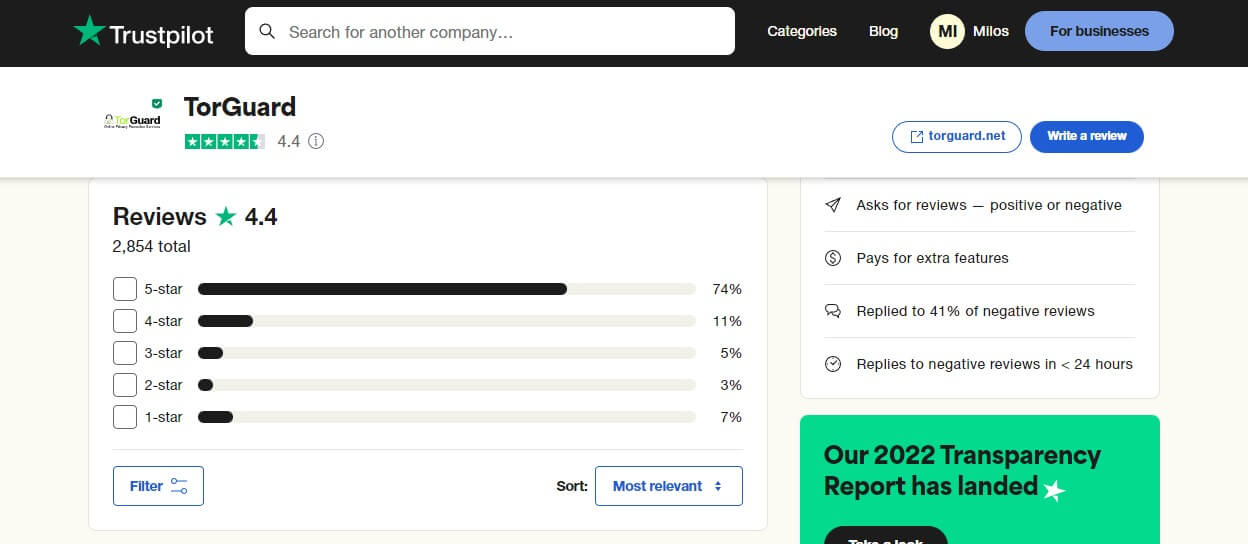
Users are praising its security, privacy, and great speeds, while complaints are mostly aimed at customer support. However, some users complained about their accounts being suspended for no particular reason.

iOS users gave TorGuard 4.7 out of 5 stars, praising its security features, dependability, and overall performance. There aren’t many complaints about it, to be honest, and those that are there are aimed at the support team which could be improved.

Android users gave TorGuard 4.3 out of 5 stars, and with the lowest rating of the bunch, it’s still respectable. Once again, security and privacy are praised but some users reported that the app stops working suddenly or it won’t connect at all.
These are the latest reviews, while most reviews are actually positive and praise the same things as before.
Conclusion: Safe & Secure, But Expensive
TorGuard is indeed a safe and secure provider that’s going to be great for torrent users and those seeking to stay anonymous online. The service boasts solid performance and offers support for a variety of devices, making it useful in many scenarios.
In this TorGuard review for 2025, we can conclude that the service can stand head-to-head with some of the most popular providers in certain aspects. While it’s not great for circumventing censorship and it has an outdated app interface, it has a lot of other qualities.
For me, the major letdown that makes this provider not worth getting is the price. Unfortunately, you can get a much better VPN for a much lower price, which you can see in our article about the best cheap VPN services.
ExpressVPN is my #1 recommendation here, as it allows you to commit for a shorter period, yet, pay pretty much the same price and get 3 free months. This provider offers a polished UI, faster speeds, and better streaming capabilities for a superb user experience.
CyberGhost is my #2 recommendation with its affordable long-term plans and a 45-day money-back guarantee for all long-term subscriptions. You can even go for NordVPN, which is still more affordable, especially if we include TorGuard’s dedicated streaming IPs that bump up the price significantly.
As for TorGuard… well, let’s just say it’s a good product with lots of features at a price that could be a bit lower. After all, it lacks the polish of all three aforementioned providers which makes it not particularly friendly to beginners and inexperienced users.
If that’s okay with you, the customizability of TorGuard and its security features are surely going to be a highlight for you. If you don’t want to tweak different settings and you want the provider to work in all scenarios with a single click of a mouse, the three providers I mentioned are vastly superior.
